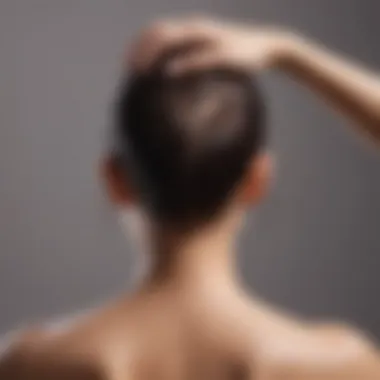Unveiling the Ultimate Tips for Hair Growth and Length Enhancement


Fashion and Hair Growth
When it comes to promoting hair growth and length, staying updated on fashion trends can actually play a significant role. The latest fashion trends often include hairstyles that accentuate the beauty of long hair, providing inspiration for individuals looking to nurture their locks. Understanding seasonal fashion trends becomes crucial as different seasons may require varying hair care routines to combat potential adverse effects on hair health. Additionally, highlighting fashion week highlights can offer insights into innovative styles that can complement and enhance longer hair looks.
Nutrition and Hair Health
A key aspect of promoting hair growth involves paying attention to nutrition. Essential nutrients such as biotin, vitamins A, C, D, and E, as well as iron and zinc, play vital roles in supporting healthy hair growth. Incorporating these nutrients into one's diet through a balanced and diverse meal plan can significantly impact hair length and strength. Moreover, crafting nutritious meal plans tailored to promoting hair health becomes paramount in the journey towards achieving longer, healthier hair.
Hair Care Routines
Developing and adhering to an effective hair care routine is essential for maintaining optimal hair health and promoting growth. Delving into the details of personalized hair care practices, including shampooing frequency, suitable hair products, and proper styling techniques, can contribute immensely to retaining hair length and vitality. Furthermore, exploring natural and holistic hair care approaches can provide additional insights into sustainable practices that benefit both hair growth and overall well-being.
Styling Techniques for Lengthy Locks
When aiming to showcase lengthy and luscious hair, mastering suitable styling techniques becomes imperative. Investigating various styling methods, such as braiding, using heatless curling techniques, and protective styling, can help minimize hair damage and breakage, thus preserving hair length over time. Understanding the significance of gentle handling and appropriate styling tools is key to ensuring that longer hair remains healthy and vibrant.
Synthesizing Hair Growth Tips
In the pursuit of fostering hair growth and achieving lengthier locks, integrating the diverse range of tips discussed above can pave the way for success. By amalgamating fashion insights, nutritional guidance, effective hair care routines, and styling expertise, individuals can cultivate a holistic approach towards nurturing their hair. Embracing these tips within a personalized hair care regimen tailored to one's unique needs and preferences can lead to noticeable improvements in hair length, quality, and overall appearance.
Understanding Hair Growth
Understanding hair growth is crucial in the pursuit of attaining long and healthy hair. By comprehending the intricacies of the hair growth cycle, individuals can personalize their approach to hair care effectively. This section delves into the fundamental aspects of how hair grows, providing essential insights for optimal hair health.
Hair Growth Cycle
Anagen Phase
The Anagen Phase represents the period of active hair growth, where the hair follicles are continually producing new cells. This phase plays a significant role in determining the length and quality of the hair strands. Its prolonged duration results in longer hair, making it a preferred phase for individuals aiming to enhance hair length.
Catagen Phase
Contrastingly, the Catagen Phase signifies a transitional stage where hair growth stops, and the hair follicles shrink. While this phase may seem counterproductive, it is essential for renewing hair follicles and ensuring the health of the scalp. Understanding the Catagen Phase contributes to maintaining a balance in the hair growth cycle.
Telogen Phase
The Telogen Phase denotes the resting phase of the hair growth cycle, marking the shedding of hair strands to pave the way for new growth. Although hair shedding in this phase may seem concerning, it is a natural process vital for overall hair health. Recognizing the significance of the Telogen Phase aids in comprehending the complete hair growth cycle.
Factors Influencing Hair Growth
Genetics
Genetics play a pivotal role in determining an individual's hair growth patterns and qualities. Understanding one's genetic predispositions to hair growth can guide personalized hair care routines and treatments. Acknowledging the impact of genetics is essential in formulating effective strategies tailored to specific hair needs.
Nutrition


Nutrition acts as a cornerstone for promoting healthy hair growth. Essential nutrients like vitamins, minerals, and omega-3 fatty acids nourish the hair follicles from within, fostering robust and vibrant hair growth. Emphasizing a nutrient-rich diet enhances the overall health and vitality of the hair, underscoring the importance of proper nutrition in achieving desired hair length.
Stress Levels
The impact of stress on hair growth cannot be understated, as heightened stress levels can lead to hair loss and hinder the natural growth cycle. Managing stress through mindfulness practices, regular exercise, and sufficient sleep is paramount for maintaining optimal hair health. By addressing stress levels, individuals can support holistic approaches to promoting hair growth and length.
Nutritional Support for Hair Health
Nutritional support plays a crucial role in maintaining optimal hair health and promoting robust hair growth. By focusing on specific elements such as essential nutrients, the benefits are numerous. Adequate nutrition is essential for supporting healthy hair follicles and preventing issues like hair loss. When considering nutritional support for hair health, factors like vitamins, minerals, and omega-3 fatty acids are key components to achieving long, luscious locks.
Essential Nutrients for Hair Growth
Vitamins (A, B, , , E)
Vitamins, including Vitamin A, B, C, D, and E, are vital for hair growth and overall hair health. Each of these vitamins contributes uniquely to the strength and vitality of the hair. For instance, Vitamin A helps in the production of sebum, an oily substance that moisturizes the scalp. Vitamin B supports the creation of red blood cells, essential for transporting oxygen and nutrients to the hair follicles. Vitamin C aids in collagen production, necessary for hair structure. Vitamin D can help stimulate hair follicles, promoting growth. Finally, Vitamin E acts as an antioxidant, protecting the hair from oxidative stress. Incorporating these vitamins into the diet can address specific hair health needs and enhance growth.
Minerals (Iron, Zinc, Biotin)
Minerals such as iron, zinc, and biotin are essential for maintaining healthy hair growth. Iron aids in carrying oxygen to hair follicles, promoting growth and preventing hair loss. Zinc supports hair tissue growth and repair, playing a crucial role in hair health. Biotin, commonly known as Vitamin H, is essential for the production of keratin, the main protein making up the hair strands. These minerals are significant in ensuring the strength and vitality of the hair, making them integral components of a balanced diet for optimal hair growth.
Omega-3 Fatty Acids
Omega-3 fatty acids are known for their anti-inflammatory properties, which can benefit the hair and scalp. These fatty acids help nourish hair follicles, promoting growth and preventing hair thinning. Additionally, omega-3s contribute to scalp health, reducing dryness and flakiness. Including sources of omega-3 fatty acids like fish, chia seeds, and walnuts in the diet can significantly improve hair quality and support growth.
Healthy Diet for Hair Length
Protein-Rich Foods
Protein is essential for hair growth as hair follicles are made up of protein. Including sources of protein like lean meats, poultry, eggs, and legumes in the diet can promote hair strength and growth. Proteins contain amino acids that are the building blocks of hair strands, contributing to their thickness and resilience. Ensuring an adequate intake of protein-rich foods supports overall hair health and can lead to longer, stronger hair.
Antioxidant-Rich Fruits and Vegetables
Antioxidants found in fruits and vegetables play a vital role in protecting hair follicles from damage caused by free radicals. Berries, spinach, kale, and citrus fruits are rich in antioxidants that help maintain scalp health and promote hair growth. These nutrients combat oxidative stress, promoting a healthy environment for hair to thrive. Including a variety of colorful fruits and vegetables in the diet ensures a robust supply of antioxidants essential for optimal hair length.
Hydration Importance
Proper hydration is essential for maintaining healthy hair and promoting length. Water makes up a significant portion of the hair strand, contributing to its elasticity and strength. Adequate hydration ensures that the hair remains moisturized, preventing dryness and breakage. Incorporating ample water intake into the daily routine supports overall hair health and can contribute to achieving desired hair length.
Effective Hair Care Practices
Effective hair care practices play a vital role in ensuring the health and growth of your hair. By following specific elements and routines, you can enhance the overall condition and length of your hair. Proper hair care involves various considerations such as gentle washing techniques, styling tips, and scalp care. These practices not only promote hair growth but also help in maintaining strong and beautiful hair strands.
Gentle Hair Washing Techniques
Use of Sulfate-Free Shampoos


The use of sulfate-free shampoos is a key aspect of gentle hair washing techniques. It contributes significantly to reducing damage to your hair by avoiding harsh chemicals present in regular shampoos. Sulfate-free shampoos are known for their mild cleansing properties, making them a popular choice among individuals aiming to maintain healthy and long hair. The unique feature of sulfate-free shampoos lies in their gentle formula, which helps retain the natural oils of the hair without stripping its moisture. This aspect makes them a beneficial choice for individuals looking to improve the overall health of their hair.
Avoiding Hot Water
Avoiding hot water during hair wash is essential for preserving the moisture and strength of your hair. Hot water can strip the hair of its natural oils, leading to dryness and breakage. By using lukewarm or cold water, you can prevent damage and maintain the integrity of your hair strands. The unique feature of avoiding hot water is its ability to keep the hair cuticles sealed and hydrated, resulting in healthier and longer hair. This simple yet effective practice is advantageous for individuals seeking to improve the condition of their hair.
Proper Conditioning
Proper conditioning plays a crucial role in keeping your hair nourished and manageable. The key characteristic of proper conditioning is its ability to replenish moisture and nutrients lost during washing and styling. By using a suitable conditioner for your hair type, you can enhance its softness and shine. Proper conditioning also helps in detangling hair, reducing frizz, and promoting overall hair health. The unique feature of proper conditioning lies in its ability to provide protection and nourishment to the hair cuticles, resulting in improved texture and appearance. This practice is advantageous for individuals looking to maintain long and luscious hair.
Styling Tips for Hair Length
Avoiding Heat Damage
Avoiding heat damage is a crucial aspect of preserving the strength and length of your hair. Heat styling tools such as curling irons and straighteners can cause significant damage to the hair strands, leading to breakage and dullness. By minimizing the use of heat styling and using protective products, you can prevent long-term harm to your hair. The key characteristic of avoiding heat damage is its role in maintaining the natural structure of the hair, preventing protein loss and brittleness. This practice is a beneficial choice for individuals looking to maintain a healthy and vibrant mane.
Protective Hairstyles
Choosing protective hairstyles is essential for shielding your hair from environmental stressors and mechanical damage. Protective styles such as braids, buns, and twists help in minimizing manipulation and reducing tension on the hair follicles. By opting for these styles, you can keep your hair secure and less prone to breakage. The unique feature of protective hairstyles is their ability to promote hair growth by maintaining the integrity of the strands. This practice is advantageous for individuals seeking to grow and retain longer hair.
Regular Trimming
Regular trimming plays a significant role in preserving the overall health and appearance of your hair. Trimming removes split ends and damaged sections, preventing them from traveling up the hair shaft and causing further breakage. By scheduling regular trims every 6-8 weeks, you can maintain the shape and vitality of your hair. The key characteristic of regular trimming is its contribution to hair growth by eliminating factors that hinder length retention. This practice is a beneficial choice for individuals looking to achieve and maintain long and healthy hair.
Scalp Care Importance
Massaging Techniques
Incorporating massaging techniques into your scalp care routine can promote blood circulation and stimulate hair follicles. Scalp massages help in distributing natural oils, enhancing hair growth, and improving overall scalp health. The key characteristic of massaging techniques is their ability to relax the scalp muscles and relieve tension, promoting a conducive environment for hair growth. This practice is a popular choice for individuals aiming to improve blood flow to the scalp and enhance hair length.
Use of Scalp Serums
Utilizing scalp serums can provide additional nourishment and protection to your scalp and hair follicles. Scalp serums contain essential vitamins and nutrients that can strengthen the hair roots and encourage healthy growth. The unique feature of scalp serums lies in their targeted treatment approach, addressing specific scalp concerns such as itching, dandruff, or dryness. By incorporating scalp serums into your routine, you can improve the overall condition of your scalp and promote optimal hair growth. This practice is advantageous for individuals looking to enhance the health and length of their hair.
Maintaining Scalp Hygiene
Maintaining scalp hygiene is essential for preventing issues such as dandruff, oiliness, and product buildup. A clean and healthy scalp provides a strong foundation for hair growth and ensures that hair follicles are not blocked or compromised. The key characteristic of maintaining scalp hygiene is its role in creating an optimal environment for hair growth and minimizing scalp-related issues. This practice is beneficial for individuals seeking to maintain a balanced scalp condition and promote the length and vitality of their hair.
Lifestyle Changes for Hair Growth
In the quest for promoting hair growth and achieving longer, healthier hair, lifestyle changes play a pivotal role. By adopting specific elements and making conscious choices, individuals can significantly impact the health and length of their hair. Lifestyle changes encompass various benefits, including enhanced overall well-being and vitality. Considering lifestyle changes for hair growth involves a holistic approach that addresses not only external factors but also internal well-being and health.
Reducing Stress Levels
Stress is a common culprit behind hair issues and can hinder natural hair growth. Engaging in mindfulness practices is one effective way to combat stress. Mindfulness practices involve focusing on the present moment without judgment, which can help reduce overall stress levels. This technique is popular for its ability to promote relaxation and mental clarity. Embracing mindfulness practices in the context of promoting hair growth can aid in creating a conducive internal environment for healthy hair.


Regular Exercise
Regular physical activity is another essential aspect of reducing stress levels and promoting overall health, including hair growth. Exercise triggers the release of endorphins, the body's natural stress relievers, which can positively impact hair health. Consistent exercise also helps in improving circulation, ensuring that the scalp receives an adequate supply of nutrients and oxygen for optimal hair growth. Integrating regular exercise into one's routine is a beneficial choice for individuals aiming to enhance their hair length and health.
Adequate Sleep
Adequate sleep is crucial for allowing the body's repair and regeneration processes to occur, including hair growth. During deep sleep stages, various hormones responsible for cell growth and repair are released, contributing to healthy hair follicles. Lack of sleep can disrupt these processes, potentially leading to hair issues like breakage and thinning. Prioritizing sufficient and quality sleep is advantageous in fostering optimal conditions for promoting hair growth and length.
Avoiding Hair Damaging Habits
Alongside adopting beneficial practices, avoiding detrimental habits is equally important for maintaining healthy hair. Overstyling, such as excessive heat styling or tight hairstyles, can damage hair follicles and lead to breakage. Chemical treatments like bleaching or frequent coloring can weaken the hair structure and result in brittleness. Tight hairstyles, such as braids or ponytails pulled tightly, can cause tension on the hair strands and scalp, leading to hair loss. Recognizing and avoiding these damaging habits is key to safeguarding hair health and promoting optimal growth.
Overstyling
Overstyling involves subjecting hair to excessive heat from styling tools like straighteners or curling irons, causing damage to the hair cuticle. This practice can lead to dryness, breakage, and split ends, hindering hair growth. Opting for heat-protectant products and limiting heat styling sessions can help mitigate the negative effects of overstyling, promoting healthier hair.
Chemical Treatments
Chemical treatments, including bleaching, perming, and coloring, can chemically alter the hair structure, making it more prone to damage. Harsh chemicals in these treatments can strip the hair of its natural oils and proteins, resulting in weakened strands and potential hair breakage. Choosing gentle and nourishing hair products, as well as minimizing the frequency of chemical treatments, is crucial in preserving the hair's strength and promoting growth.
Tight Hairstyles
Tight hairstyles exert constant pressure on the hair follicles and scalp, leading to a condition known as traction alopecia. This type of hair loss is preventable by avoiding tight hairstyles that pull on the hair, causing stress and damage. Opting for looser hairstyles and avoiding tight hair accessories can help maintain healthy hair and encourage natural growth without unnecessary strain.
Professional Advice and Treatments
In the realm of hair growth and length, seeking professional advice and treatments can be a pivotal step towards achieving desired results. Consulting with a trichologist, a hair and scalp specialist, offers expertise that delves deeper into the underlying issues influencing hair health. These professionals conduct thorough evaluations to pinpoint factors affecting hair growth. Diagnostic tests play a crucial role in this process, providing insights into nutritional deficiencies, hormonal imbalances, or scalp conditions that might impede hair growth. These tests are essential for customized treatment plans, ensuring targeted solutions to address individual needs efficiently.
Consulting a Trichologist
Trichologists utilize advanced tools and scientific knowledge to analyze hair health comprehensively. Diagnostic tests stand out as a cornerstone in assessing relevant biomarkers that can influence hair growth. By conducting blood tests to assess levels of iron, zinc, B vitamins, and hormones, trichologists gain insights into the body's internal functions impacting hair health. Understanding these key indicators helps in devising personalized treatment plans that address specific deficiencies or imbalances, thereby promoting optimal hair growth and length.
Personalized Treatment Plans
Tailored treatment plans crafted by trichologists are tailored to match individual needs and hair goals. These plans may include dietary recommendations to boost nutritional intake, specialized hair care routines, or supplement regimens to address deficiencies. By taking into account each person's unique health profile and hair characteristics, personalized plans aim to optimize results effectively. This individualized approach sets the foundation for sustainable hair growth and enhances overall hair health.
Advanced Procedures
In cases where conventional treatments yield limited results, advanced procedures emerge as a viable option for promoting hair growth and achieving desired length. These procedures encompass cutting-edge technologies such as platelet-rich plasma therapy or low-level laser therapy, designed to stimulate hair follicles and enhance blood circulation in the scalp. While these procedures offer promising results, they also come with specific considerations, including cost, frequency of sessions, and possible side effects that individuals need to weigh before opting for such interventions.
Hair Growth Supplements
Apart from professional advice, incorporating hair growth supplements can provide nourishment that supports healthy hair development and enhances hair length. These supplements, enriched with vitamins, minerals, and nutritional compounds, offer a convenient way to fill any gaps in one's diet that may impact hair health. The role of supplements in encouraging hair growth lies in their ability to provide essential nutrients that may be lacking from regular food intake.
Choosing the Right Products
Selecting the appropriate supplements is vital in ensuring their efficacy in promoting hair growth and length. Looking for products that are high-quality, clinically tested, and formulated by reputable brands enhances the likelihood of achieving desired results. When choosing products, factors such as ingredient transparency, third-party certifications, and customer reviews can guide individuals in picking effective supplements that align with their hair care goals.
Consultation with Healthcare Providers
Prior to integrating hair growth supplements, consulting with healthcare providers, especially registered dietitians or dermatologists, can offer valuable insights into the most suitable supplement choices based on one's health status and nutritional needs. These professionals can assess existing health conditions, possible interactions with medications, and recommend supplement dosages that are safe and efficient. Regular consultations ensure that individuals are on the right nutritional track for supporting optimal hair growth and achieving desired hair length.



